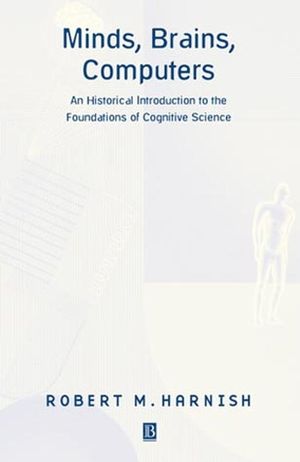Minds, Brains, Computers: An Historical Introduction to the Foundations of Cognitive ScienceISBN: 978-0-631-21259-1
Hardcover
468 pages
October 2001, Wiley-Blackwell
 This is a Print-on-Demand title. It will be printed specifically to fill your order. Please allow an additional 10-15 days delivery time. The book is not returnable.
|
||||||
Preface.
Acknowledgements.
Introduction: What is Cognitive Science?.
Broad Construal.
Narrow Construal.
Cognition: Broad and Narrow.
Computation: Broad and Narrow.
The Working Conception of Cognitive Science.
Appendix: 1978 Sloan Report.
Study Questions.
Suggested Reading.
Part I: Historical Background:.
Introduction.
1. Associationism.
Introduction: What is Associationism?.
Generic Empiricist Associationism.
Varieties of Associationism.
Locke and James.
The End of Classical Associationism.
Study Questions.
Suggested Reading.
2. Behaviorism and Cognitivism.
Introduction.
The Rise of Behaviorism and Stimulus-Response Psychology.
Challenges to Behaviorism and Stimulus-Response Psychology.
Cognitivism: Information Processing Psychology.
Study Questions.
Suggested Reading.
3. Biological Background.
Introduction.
Brain Ventricles vs. Brain Substance.
Cortical Localization vs. Holism.
Nerve Net Theory vs. the Neuron Doctrine.
The First Half of the Twentieth Century.
Study Questions.
Suggested Reading.
4. Neuro-Logical Background.
Introduction.
Neural Networks and the Logic of Propositions.
Perceptrons.
Linear Separability and XOR: McCulloch and Pitts Nets and Perceptrons.
Simple Detector Semantics.
Study Questions.
Suggested Reading.
Part II: The Digital Computational Theory of Mind:.
Introduction.
5. A Sample Artificial Intelligence Model: SHRDLU.
Introduction.
SHRDLU Dialogue.
The Program.
Limitations.
Historical Role of SHRDLU.
Study Questions.
Suggested Reading.
6. Architecture(s).
Introduction: Some Preliminary Concepts.
Turing Machines.
von Neumann Machines.
Production Systems.
Intermezzo: Pandemonium.
Taxonomizing Architectures (I).
Study Questions.
Suggested Reading.
7. Representation(s).
Introduction: The Variety of Representations: Some Standard High Level Formats.
The Nature of Digital Computational Representation.
Interpretational Semantics.
Study Questions.
Suggested Reading.
8. The Digital Computational Theory of Mind.
Introduction.
From the Representational Theory of Mind to the Computational Theory of Mind.
The Digital Computational Theory of Mind and the Language of Thought.
DCTM and the Mind-Body Problem.
DCTM and Representational Content.
DCTM and Consciousness (I).
Modular (Cognitive) Architectures.
Appendix: Modularity: Gall vs. Fodor.
Study Questions.
Suggested Reading.
9. Criticisms of the Digital Computational Theory of Mind.
Introduction: The Turing Test (Again).
Against Strong AI: Searle and the Chinese Room.
The Digital Computational Mind in the Chinese Room.
The DCTM and Consciousness (II).
The DCTM and Mental Content.
Against Cognitivism.
DCTM Hardward and the Brain.
The Domain and Scope of the DCTM.
Study Questions.
Suggested Reading.
Part III: Connectionist Computational Theory of Mind:.
Introduction.
10. Sample Connectionist Networks.
Introduction.
Jets and Sharks.
NETtalk.
Study Questions.
Further Reading.
11. Connectionism: Basic Notions and Variations.
Introduction.
Basic Notions and Terminology.
Learning and Training.
Representation(s).
Generic Connectionism.
Study Questions.
Suggested Reading.
12. The Connectionist Computational Theory of Mind.
Introduction.
The Connectionist Computational Theory of Mind.
Motivations for the CCTM.
A Bit of History: Connectionism and Associationism.
Interpreting Connectionism: PTC.
Taxonomizing Architectures (II).
Appendix: Connectionism and Turing's Unorganized Machines.
Study Questions.
Suggested Reading.
13. Criticisms of the Connectionist Computational Theory of Mind.
Introduction.
Differences: The CCTM and the Brain.
CCTM: Lures of Connectionism.
CCTM and The Chinese Gym.
CCTM and Propositional Attitudes.
CCTM Detector Semantics.
CCTM: Problems and Prospects.
Study Questions.
Suggested Reading.
Coda: Computation for Cognitive Science or What IS a Computer, Anyway?.
Introduction.
Functional View of Computers.
Levels of Description View of Computers.
Combined Functional-Descriptive View of Computers.
Levels of Computation: Stabler.
Digital and Connectionist Computers.
Is Everything a Computer?.
Study Questions.
Suggested Reading.
Bibliography.
Index.



